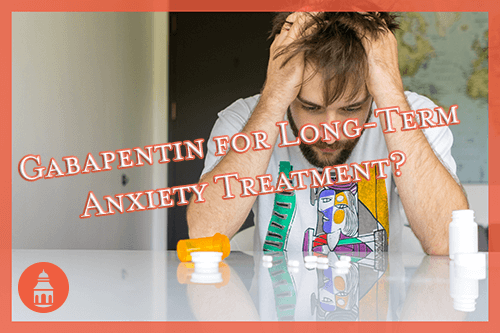
Gabapentin is a prescription drug that was approved by the Food and Drug Administration (FDA) in 1993 to prevent partial seizures related to epilepsy. Currently, the drug is also prescribed to treat postherpetic neuropathy, or pain or numb feelings in the hands and feet due specifically to shingles, after being approved for this use in 2004. It is also sometimes used in hospital settings or before surgery as an analgesic.
Since gabapentin mimics the effects of gamma-aminobutyric acid (GABA), a neurotransmitter associated with slowing communication between neurons, the drug has long been prescribed off-label for numerous treatments, including use as an anti-anxiety medication. Gabapentin’s effects are somewhat similar to those of benzodiazepines like Klonopin, Xanax, and Valium because it reduces rapid firing between neurons to create a sense of calm. However, benzodiazepines act on the brain by binding to GABA receptors, which gabapentin does not do. For some people, this may mean gabapentin is more effective for treating anxiety without triggering abuse or addiction.
Some surveys suggest that up to 90 percent of gabapentin prescriptions are for off-label applications, including the treatment of anxiety disorders. Since 1999, research suggests that the drug is both effective and ineffective in treating this mental condition. The medication’s effectiveness depends on several factors.
Gabapentin Shown to Be Effective in Several Studies
Several studies between 1999 and 2013 suggest that gabapentin is very effective as a treatment for anxiety in specific circumstances.
- 1999: The first randomized, double-blind study into gabapentin’s use as an anxiolytic divided 69 participants into two groups for 14 weeks. Although the study’s authors admit that the experiment was very small, they found that gabapentin was effective in reducing social anxiety in participants.
- 2002: The second study examined gabapentin’s potential benefits as an adjunct treatment for bipolar disorders. Researchers found that the medication relieved anxiety associated with the condition.
- 2003: Study participants took gabapentin to relieve the anxiety of public speaking, and the drug was found effective for this short-term treatment.
- 2005: A study found that administering gabapentin before surgery helped relieve anxiety before and after the procedure, and reduced the need to prescribe opioid painkillers.
- 2009: A longer study with eight participants found that gabapentin was effective in treating social anxiety disorder in adults.
- 2012: By this time, gabapentin was widely prescribed off-label to treat anxiety but acknowledged that the studies touting its effectiveness did not provide sufficient clinical evidence for this prescription. The group gathered 420 participants who had breast cancer and who had completed chemotherapy. Low doses of gabapentin were found to have strong anxiolytic effects in this specific group.
- 2013: Two studies in this year reported that gabapentin was effective in treating general anxiety and preoperative anxiety.
Doses used to treat anxiety in these studies ranged from 300 mg (a very low dose) to 3600 mg; the average dose was 600-1200 mg. A prescribing physician will work to find the lowest possible effective dose, but that can vary depending on age, gender, body mass, and some other factors.
Downsides to Using Gabapentin as an Anxiety Treatment
Although the drug may be a good approach for short-term treatment of anxiety, taking it for longer than a few weeks may not be appropriate for most people. Gabapentin has some side effects that can become long-term health problems.
Additionally, gabapentin is only approved to treat nerve issues and seizures. Taking this medication for several weeks to treat anxiety can lead to withdrawal symptoms that mimic other, more serious conditions, including seizures, insomnia, panic attacks, and nerve pain.
While many people have taken gabapentin for anxiety and benefitted from this treatment, it is not likely appropriate for most adults, and it is not appropriate for children or the elderly. Studies examining the medication’s effectiveness have all been small, looking at treatment for specific populations with specific causes or types of anxiety. The drug is not appropriate for everyone, and it should not be used without associated counseling or therapy.
People who struggle with anxiety disorders are also at greater risk for developing problems with substance abuse. While this is mostly associated with alcohol use disorder, many of those with anxiety misuse and abuse prescription anti-anxiety medications like benzodiazepines. There is little information on abuse of gabapentin among people with anxiety, but it is a risk that must be considered, as gabapentin becomes a more widely abused drug.
It’s Never Too Late to Get Help
